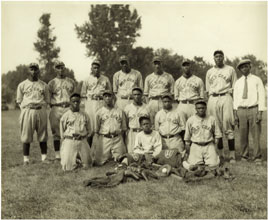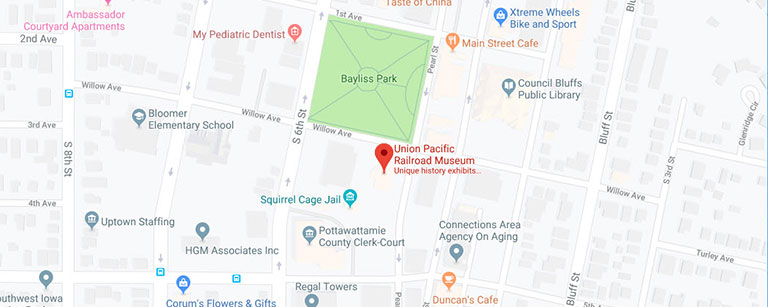Union Pacific's Gold Coast Baseball Team of 1929

Union Pacific Gold Coast baseball team, 1929.
Pictured are, back row, left to right: J. Grayson, c.f.; I. Foster, l.f.; Ira Taylor, p; Doc Manager, p; Lacy Stewart, c; Soup Lawson, r.f.; Carl Bowman, p.; Richard B. Stanley, secretary. Front Row: Adolph Bolden, s.s.; Eddie Davis, 2b.; Fred Wakefield, 1b.; Wan Young, manager and infielder; Leroy Triggs, r.f.; and "Little Soup" Lawson, mascot.
This photograph is of the Union Pacific Gold Coast Baseball team which won the Omaha City Colored League in 1929. All of these team members were employed as porters out of the Omaha Union Station.
The 1920s saw an insurgence of family oriented initiatives within Union Pacific. At a time when corporations were growing by leaps and bounds, employees often lamented the loss of the attention and care given in the old "Mom and Pop" businesses. There was an increased distance between the management and the rank and file employee. These family oriented initiatives included the Union Pacific Old Timer's Clubs for employees with more than 20 years service, the UP Band, UP Chorus, and the Drum and Bugle Corp, which all allowed employees to join and be part of the Union Pacific family. Athletics was another way in which people could participate in their community and Union Pacific and their employees often stepped forward to sponsor teams. Union Pacific employees created teams and leagues in various sports, including baseball, and competed with each other and in their communities. Central to the African American railroad community were the Pullman Porters.
George Pullman launched his sleeping car business in 1865 as the Civil War was ending. He needed to hire hundreds of maids, porters, cooks and waiters at a time when thousands of recently freed slaves were starting new lives. Beginning in the late 1860s, the Pullman Company offered jobs to African Americans who had very few other opportunities. For nearly 100 years, the Pullman Company hired almost exclusively African Americans, becoming the largest single employer of African Americans in the United States. The Department of Labor's 1926 report counted more than 20,000 African Americans working as railroad porters, making them the largest category of black labor on U.S. railroads.
In spite of the hardships, most Pullman employees took great pride in their work and valued the opportunities the jobs provided. In an effort to reduce discrimination and improve working conditions, African American porters formed the Brotherhood of Sleeping Car Porters (BSCP) in 1925. The union's founder and president, A. Philip Randolph, negotiated for years with the Pullman Company to win recognition of the nation's first African-American labor union. Finally in 1937, the BSCP and Pullman Company sat down to negotiate, resulting in a reduction of monthly on-duty hours from 400 to 240 and a 20 percent annual salary increase. Equally important, Randolph secured protection against the discrimination that had cost so many black employees their jobs.

